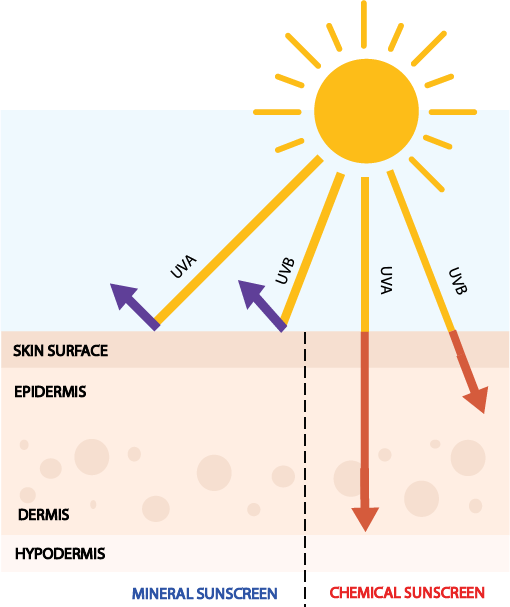
“Sunblock: Not just screening the UV radiation”
May 17, 2022 No Comments on “Sunblock: Not just screening the UV radiation”When closely scrutinizing about the impact of the sunrays on the skin, studies show that sun’s ultraviolet light can cause major damage to it. Being out in sun without safeguarding our skin can cause a much physical damage by UVA and UVB radiation.
Have you ever wondered what is the difference between UVA and UVB?
Well, here’s the answer:
UVA- Affects inner cells in the top layer of skin including dermis.
UVB- Affects cells present in the top layer of the skin.
You might be surprised to know that SPF measures only UVB protection and does not indicate anything about UVA protection. In another context, some active sunscreen ingredients can block UVB very well, but let harmful UVA radiation pass freely. So, it is important to use a product that blocks both UVA and UVB sunrays equally.
What gives better protection from sun-damage- Sunscreen or Sunblock?
While there’s a huge fallacy about the difference and is often mistaken as one which in-fact are contrast with one another. To study this closely let us first see the difference between them.
● Sunblock is the physical barrier between skin and sunrays says a board-certified dermatologist; Sunscreens on the other hand provide sun protection but it is still not clear how potentially damaging they could be with consistent use.
●Sunblock works almost immediately – one can apply it right before sun exposure and there’s no need to wait for it to get absorbed as it forms a physical barrier. ‘Sunblock’ literally forms a physical barrier to block the UV rays (Both, UVA and UVB) with right mineral filters like pre-dispersed UV filters, powder UV filters.
● Chemical Sunscreens contains ingredients like oxybenzone, avobenzone etc. which are more likely to get absorbed by skin whereas, a physical sunblock formulation contains barrier-forming ingredients like titanium-dioxide, zinc oxide which along with film-former forms layer obstructing sunrays to penetrate inside the skin.

What are the Common Myths and Apprehensions?
●Mineral UV filters are micro plastics
Micro plastics are particles containing a solid polymer to which rest of the composition have been added in the formulation. This myth generally comes from a misunderstanding of the composition of mineral UV filters, which does not necessarily have polymeric materials. So, non- micro plastics UV filters would be a recommendation.
●Mineral UV filters cause white cast
This myth often discomforts manufacturers from trying sun-care products containing TiO2 and ZnO. It works by absorbing and scattering light from skin surface that might lead to a white tint. However, extremely fine size non-nano UV filters that creates invisible formulation on application are available and recommended.
● Mineral sun-care products can be unstable
Well, the truth remains that all types of sun-care products and UV filters pose challenges for formulators. There are some myths that organic/chemical filters are easier to stabilize in formulation, compared to particles which are harder to stabilize only due to tendency to agglomerate and sediment. However organic/chemical filters can crystalize out of solution and require the right oil-phase at the right level to be stable, so are not necessarily the easier option.
Inorganic/mineral filters on the other hand can be rightly designed with dispersing agents which assist the even suspension of particles in formulation. Such formulations are highly stable to agglomeration and sedimentation that makes them stable and more straightforward.
The bottom line: Which sun-care product should we choose?
Well, while the scientific evidence associating common chemical filters with potential hormone disruption and environmental damage continue to accumulate, consumers should choose whether to take part in this experiment or opt for using safer mineral filters. Currently there are two active ingredients, titanium oxide and zinc oxide, determined as safe and effective by the FDA’s proposed ruling and others are counting faster. Titanium dioxide doesn’t protect you against the full range of UVA rays, hence the synergistic zinc oxide is the perfect solution as the main active ingredient.
So, if we could recommend you a tip for prolonged sun-care, sunblock with mineral UV filters would be it. Sunblock provides protection to skin and lowers the risk of developing skin concerns. Now-a-days sunblock with zero white cast are available. For daily use, Sun-care product which comes with water-resistant properties and has an SPF of at least 30 would be commended as it has a longer effect and does not need to be reapplied often. Perusal of INCI is always recommended as it gives a clear idea and information about the key ingredients in a product.
Clueing in- One can always choose sunblock with optimum SPF and suitable film-former.
For more information; get in touch with us through info@vimallifesciences.com


Leave a comment